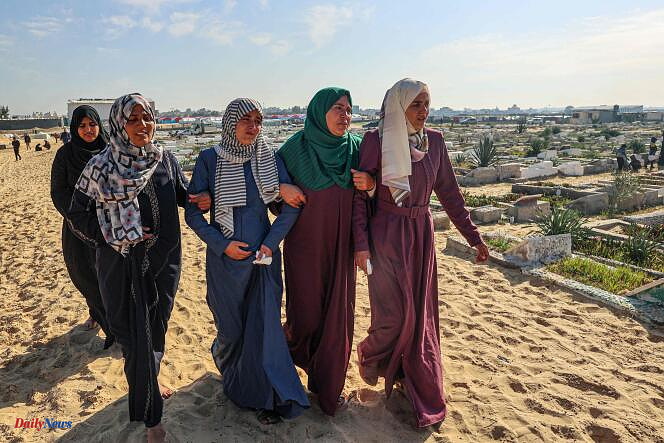Israeli bombings and fighting between the army and Hamas continued unabated across the Palestinian territory on Wednesday, February 21, where 118 people were killed in twenty-four hours, according to the Hamas health ministry. The situation is particularly alarming in the north of the enclave, prey to “chaos and violence”, according to the World Food Program (WFP), which suspended the distribution of its aid in this sector on Tuesday.
According to witnesses, fighting took place on Wednesday in the south of the Gaza Strip, in Khan Younes, where soldiers are tracking down Hamas fighters in the middle of the ruins, but also in Zaytoun and Shujaiya, two sectors of the city of Gaza, in the north. The Israeli army claimed to have killed “dozens of terrorists” in Zaytoun on Tuesday and destroyed “dozens of targets.” It said it was “intensifying” its operations in Khan Younes.
The war, which began on October 7, 2023, left 29,313 dead in Gaza, according to the Hamas health ministry, and more than 1,160 people on Israel's side, according to an Agence France-Presse count made from official Israeli data.
The director general of the World Health Organization said Wednesday that the situation was “inhumane.” “Gaza has become a death zone,” said Tedros Adhanom Ghebreyesus.
The director general of the World Health Organization said Wednesday that the “health and humanitarian” situation in the Gaza Strip, after more than four months of war, is “inhumane.” “What world do we live in when people can’t get food and water, or when people who can’t even walk can’t receive care? “, declared Tedros Adhanom Ghebreyesus, during a regular press conference in Geneva.
According to the UN, 2.2 million people, the vast majority of the population, are threatened with famine in the Gaza Strip, besieged by Israel since the start of the war on October 7, 2023.
Humanitarian aid enters Gaza mainly through Rafah, but its transport to the north is made almost impossible by the destruction and fighting which isolate this region from the rest of the territory.
Israeli authorities announced on Wednesday the entry, the day before, of 98 trucks with humanitarian aid into Gaza, while a collective of international NGOs (AIDA) deplored the slowness of the inspection process and the blockage of dozens of trucks for several days at the border.
The Palestinian Red Crescent for its part called on Wednesday “UN institutions to intensify their aid, in particular for areas in the north of the Gaza Strip, where 400,000 people are threatened with famine.”
The head of the Hamas political bureau, Ismaïl Haniyeh, based in Qatar, is due to discuss Wednesday in Cairo with the head of the Egyptian intelligence services, Abbas Kamel, in particular the “first phase” of a plan drawn up in January by the mediating countries , – Qatar, United States and Egypt – declared a Hamas source to AFP, in Gaza.
This first phase provided for a six-week truce, associated with an exchange of hostages for Palestinian prisoners held by Israel and the entry into Gaza of a large quantity of humanitarian aid. The American president's Middle East adviser, Brett McGurk, is traveling to Egypt on Wednesday and to Israel on Thursday.
Hamas is demanding a ceasefire, an Israeli withdrawal from Gaza, an end to the Israeli blockade and safe shelter for the hundreds of thousands of civilians displaced by the war. Israel, for its part, affirms that its offensive will continue until Hamas has been eliminated and the hostages freed.
The International Court of Justice (ICJ), which sits in The Hague, is holding hearings this week on the legal consequences of Israel's occupation of Palestinian territories since 1967, with an unprecedented number of fifty-two countries called to testify. Most speakers called for Israel to end its occupation following the Six-Day War, but Washington came to its ally's defense.
“The court should not conclude that Israel is legally obligated to immediately and unconditionally withdraw from the occupied territory,” said Richard Visek, legal adviser to the US State Department. “Any movement toward Israel’s withdrawal from the West Bank and Gaza requires consideration of Israel’s very real security needs,” which were reiterated on October 7, 2023, he continued.
The violence "reinforces the United States' resolve to urgently achieve definitive peace," Visek said. But “negotiations are the path to lasting peace,” he insisted.












